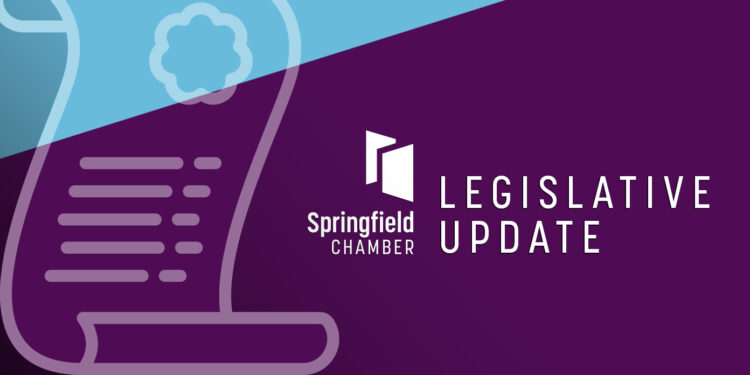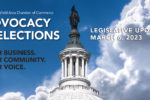The 2025 State Legislative Session is a Wrap. What Happened?

The 2025 Oregon legislative session was one of the busiest in recent memory, with over 3,500 bills introduced – many with direct implications for the state’s business climate. Through coordinated efforts with the Oregon State Chamber of Commerce (OSCC), Oregon Business and Industry, and business advocates across Oregon, the Springfield Area Chamber of Commerce stayed engaged on issues affecting business costs, liability, workforce regulation, and economic development tools. See below for recap of policies the Chamber supported and opposed, and how those policies ultimately fared in the 2025 session.
SOME QUICK STATS FROM 2025
- 21 total legislative and regulatory interventions
- 14 bills and rulemakings addressed
- Direct alignment with key economic development priorities
- Advocacy impact across state, local, and federal platforms
POLICY ENGAGEMENT HIGHLIGHTS
Fiscal Stewardship & Local Control
HB 3962 – Opposed: Would have diverted local tourism dollars by misusing Transient Lodging Tax revenue.
Result: Dead
HB 3971 – Opposed: Challenged local oversight by allowing land use circumvention through regional governance.
Result: Dead
HB 2005-A (Sections 58–63) – Opposed: Included controversial “supersiting” provisions overriding local planning.
Result: Passed
Economic Competitiveness
HB 3062 – Opposed: Sought to expand restrictive land use and environmental regulations, limiting Springfield’s growth.
Result: Dead
SB 426 – Opposed: Introduced joint liability for general contractors and property owners for subcontractor wage violations.
Result: Passed
Regulatory Oversight
HB 3119 – Supported: Would have delayed enforcement of the Advanced Clean Truck rule until 2027.
Result: Dead
DEQ ACT & HDO Rules – Opposed: Chamber opposition contributed to a two-year enforcement delay, citing costs and feasibility.
Result: 2-Year Delay
HB 3838 – Opposed: Proposed a Home Care Labor Standards Board with sweeping rulemaking authority.
Result: Dead
Federal Regulatory Impacts
FEMA PICM Model Ordinance – Opposed: Chamber successfully pushed for delay, citing increased development costs and reduced land supply.
Business Climate & Legal Reform
SB 916 – Opposed: Extended unemployment benefits to striking workers. Advocacy helped limit the expansion to a 10-week cap.
Result: Passed with Modifications
SB 174 – Opposed: Would have expanded litigation over insurance claims, raising costs and risks for employers.
Result: Dead
SB1196 – Supported: Would have reinstituted liability waivers to relieve small businesses from egregious litigation claims that drive up costs, deter insurance providers, and undermine Oregon’s business climate, particularly for tourism-related businesses.
Result: Dead
Taxes
HB 2977 – Opposed: Proposed a statewide lodging tax increase without industry input.
Result: Dead
SB 381 & SB 490 – Supported: Aimed to raise the CAT exemption threshold from $1M to $5M, benefiting thousands of small businesses.
Result: Dead
While state-level legislative engagement focused on shaping business policy, the Chamber also played a hands-on role in advancing local capital investment and community development priorities. This included endorsing grant proposals, supporting major private-sector reinvestments, and participating in strategic advisory roles. Through letters of support and agency collaboration, the Chamber helped move projects forward in areas such as housing, workforce development, public safety, and infrastructure. Some of these efforts resulted in successful funding awards, others remain under consideration, and a few were not approved, but all reflect the Chamber’s commitment to shaping a resilient, opportunity-rich future for Springfield.
LOCAL CAPITAL INVESTMENT AND PROJECT SUPPORT
Workforce & Housing for Vulnerable Youth
Scorpion Creek Ranch (SCR): Supported state lottery funding for trauma-informed housing and workforce training for homeless youth.
Healthcare Workforce Development
Bushnell University Health Professions Expansion: Supported site acquisition to expand Springfield’s pipeline of behavioral and physical health professionals.
Public Safety and Community Trust
Springfield Police Department: Backed federal funding for upgraded camera systems to support transparency and downtown business confidence.
Historic Revitalization and Housing
Springfield Historic Building Restoration: Supported grant-funded improvements to restore the historic facade of the former SPS district admin building and stimulate downtown revitalization.
Community Resiliency
Willamalane Park & Recreation District: Advocated for grants supporting emergency power systems and safety improvements to protect economic continuity.
Mobility & Connectivity
Eugene Airport: Endorsed funding to expand Concourse C and improve regional business access.
Lane Transit District: Supported transit grants for ADA upgrades and modernization of regional bike-share infrastructure.
Private Sector Capital Investment
Sierra Pacific Industries: Supported a $253M Strategic Investment Program agreement at the Eugene sawmill—one of Lane County’s largest-ever private investments.
ADVISORY ROLES AND COMMITTEE ENGAGEMENT
City of Springfield Fiscal Stability Task Force
Over a 9-week process, Vonnie Mikkelsen, the Chamber’s President & CEO, served on the City of Springfield’s Fiscal Stability Task Force to evaluate long-term municipal budget scenarios and revenue tools. This engagement reflects the Chamber’s commitment to responsible governance, sustainable funding models, and the fiscal health of the communities in which its members operate.
Statewide In-Home Care Workforce Campaign Advisory Committee
Paige Walters, the Chamber’s Director of Advocacy & Economic Development, was appointed to a statewide advisory board guiding the State of Oregon’s awareness campaign for in-home care professions. Convened by Metropolitan Group on behalf of the state, the advisory committee ensures campaign decisions are shaped by diverse perspectives in workforce development. The Chamber’s participation highlights the alignment between the campaign’s goals and the Chamber’s WorkReady initiative, bringing a regional business voice to Oregon’s broader care economy strategy.
FINAL WORD
Thanks to its Board-approved policy agenda and sharpened legislative strategy, the Springfield Chamber has strengthened its influence and delivered tangible results for the business community. By staying engaged so our members can stay focused on running their businesses, we’re helping build a stronger, smarter, more connected Springfield economy.
More about Springfield Chamber’s Business Advocacy
The Springfield Chamber’s advocacy work in 2025 reflects a strategic commitment to economic vitality, fiscal sustainability, workforce development, and regional competitiveness. Through testimony, correspondence, public-private partnerships, and strategic advisory engagement, the Chamber has served as a strong voice for its business membership, representing thousands of jobs and millions in economic output. The Chamber has engaged at the state, local, and federal levels to support policies, investments, and projects that advance business growth and strengthen community infrastructure. Find out more here: https://www.springfield-chamber.org/business-advocacy/
Discover more from Springfield Bottom Line
Subscribe to get the latest posts sent to your email.






